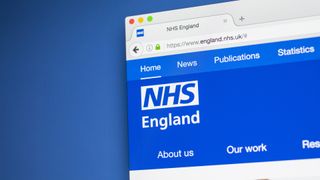Digital healthcare services 'must be internet-facing by default'
NHS Digital's internet-first guidance aims to reduce network complexity

Any new digital services built by health and social care organisations must operate over the internet by default as opposed to private NHS networks.
That's according to new guidance published by NHS Digital that extends on the public sector's cloud-first approach by recommending that Trusts and other healthcare organisations adhere to a set of Internet First' principles.
The expected benefits include easier access to digital healthcare services, closer interoperability between platforms and a far wider scope for innovation in light of this access. NHS Digital also hopes to reduce complexity and duplication in network connectivity.
The proposals are an attempt to shift organisations away from the existing centralised private network, known as the Health and Social Care Network (HSCN).
To achieve this migration, organisations must have sufficiently scaled, and have function internet connectivity, to support the needs of the healthcare services. Bodies must also be able to show internet connections are reinforced with proper security controls, as well as secure application interfaces.
NHS Digital implemented an internet-first policy in March last year, setting out the principle that all new digital services made by the organisation should be internet-facing by default. Existing services, meanwhile, would be reconfigured to fit the mould as soon as possible.
In order to meet health secretary Matt Hancock's vision for a fully accessible digital healthcare service, this policy is now being extended to apply to the entire NHS.
Get the ITPro. daily newsletter
Receive our latest news, industry updates, featured resources and more. Sign up today to receive our FREE report on AI cyber crime & security - newly updated for 2024.
"Making digital services available over the public internet supports the requirements for health and social care professionals to work flexibly from a variety of locations, using a range of access methods," the NHS Digital guidance says.
"This will reduce complexity and cost for many organisations, particularly for small health and social care providers.
"This Internet First policy and guidance supports the strategy and governance to remove the reliance on health and social care digital services on a central private network."
Among the key principles are that data sensitivity analysis should be carried out before exposing a service to the internet and that investments in new and existing services must support universal access.
Transforming existing services, meanwhile, must not present a risk to active healthcare initiatives, while users must be kept in the loop over all work being done to ensure as little disruption as possible.
"We've worked with DHSC to fire the starting gun for internet first, but while the plethora of software applications used in the NHS are made ready for the internet, the Health and Social Care Network is an important stepping stone," Tom Denwood, senior responsible owner of HSCN told IT Pro.
"This gets the NHS off N3, which is the expensive legacy network, by Aug 2020. NHS organisations are achieving very impressive like-for-like savings when moving from N3 to HSCN and the cumulative saving for the NHS will be 70m per annum. This frees up NHS budgets for digital transformation work, or the money can be ploughed back into patient care."
NHS Digital will be consulting on this guidance between now and 14 June, with health and social care organisations and service providers invited to feedback on these internet-first principles. The work is expected to be completed and fully implemented by March 2021.

Keumars Afifi-Sabet is a writer and editor that specialises in public sector, cyber security, and cloud computing. He first joined ITPro as a staff writer in April 2018 and eventually became its Features Editor. Although a regular contributor to other tech sites in the past, these days you will find Keumars on LiveScience, where he runs its Technology section.




